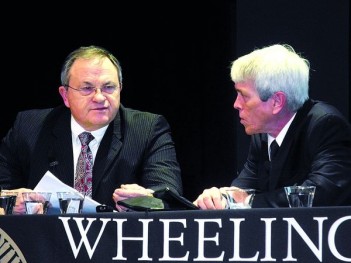
Gastar Exploration Senior Vice President and Chief Operating Officer Mike McCown, left, and Wheeling Jesuit University biology professor Ben Stout chat before a Saturday public discussion.
WHEELING, W.Va. — Although a potential $40 million windfall awaits West Virginia’s coffers if Gastar Exploration drills and fracks for natural gas under the Ohio River, at least one legislator does not believe the money outweighs the potential environmental risk such a plan could bring to the region’s drinking water supply.
More than 100 concerned students, residents, community leaders and elected officials turned out Saturday for a public discussion at Wheeling Jesuit University regarding Gastar’s plans to draw natural gas from beneath the river in Marshall County.
While river drilling was the main topic, discussion also touched on GreenHunter Resources’ plans to barge frack wastewater on the Ohio River and on above-ground storage tanks located near rivers.
“I am convinced we can do this safely – and we will demonstrate that,” Mike McCown, senior vice president and chief operating officer for Gastar, said of drilling under the Ohio River. “We have drilled over 70 Marcellus wells and two Utica wells in West Virginia.”
River Fracking
Gastar is one of several companies bidding with the West Virginia Department of Commerce to extract oil and natural gas from state-owned land lying thousands of feet below the riverbed. Noble Energy recently bid to drill on 1,400 acres beneath the river, while Statoil also is making its own plans.
Combining per acre lease payments with a 20 percent production royalty each company will pay once gas starts flowing, the state stands to have a steady stream of new revenue.
McCown said Gastar projects paying the state $749,000 in up-front lease money for about 214 acres, but said the production royalties would be the real source of revenue, as he estimated this amount could reach as high as $40 million over several years.
Delegate Shawn Fluharty, D-Ohio, said he is not sure this payment is worth the potential risk to the region’s water supply, noting legislators need to look “at the cost-benefit analysis of anything that comes across our desk.”
Once McCown referenced the $40 million figure, Fluharty asked if McCown could project Gastar’s revenue from the project.
“Yeah, it’s a lot more than that,” McCown said, though emphasizing Gastar will be doing all the work and investing the money to complete the project, with each well costing upward of $10 million to drill.
McCown believes because the Marcellus Shale is more than a mile deep in Marshall County, while the Utica Shale is more than two miles deep, the company’s horizontal drilling bores will be so far beneath the surface that nothing Gastar is doing would impact the river.
State Sen. Ryan Ferns, R-Ohio, said he does not believe fracking beneath the river would pose any more of a hazard than doing it elsewhere.
“I know the dangers and the environmental risks associated with horizontal drilling. It would appear to me, on the surface, that the risk would be nearly the same under the river,” Ferns said.
“Can we make anything 100 percent safe? I don’t think so,” Delegate David Evans, R-Marshall, added.
“The business that we do is hazardous. There are risks involved,” McCown said.
Barging, Tanks and Other Matters
If McCown came to Wheeling Jesuit prepared to debate university biology professor Ben Stout on the river project, he quickly learned Stout was more interested in other drilling and fracking concerns.
Stout and members of the Wheeling Water Warriors group continue to oppose plans by GreenHunter Resources to build a frack water recycling station at North 28th Street in Warwood. That company is now in a dispute with the U.S. Coast Guard over whether it has authority to haul wastewater drawn from the Marcellus Shale on Ohio River barges.
Stout said he is more worried about the naturally occurring, radioactive materials within the shale formations than the chemicals added during the fracking operations.
“This material needs to be handled very carefully,” he said.
Erin Bowers asked McCown about the health hazards of silica dust rising from well pads during the fracking process.
“All of our employees that are up there while the frack sand is going into the well are required to wear respirators,” McCown said about the risk of silica inhalation.
Stout said another concern is that first responders often are unaware of the dangers they face in the event of a truck spill because the vehicles are not marked as carrying hazardous waste.
“These guys need to know what is in these trucks,” he said.
Stout also urged the legislators in attendance – which included Delegate Ryan Weld, R-Brooke, and Delegate Mark Zatezalo, R-Hancock – to see that more than 90 of the thousands of chemical tanks around the state near rivers are subject to the strict standards established following the January 2014 Freedom Industries leak in Charleston.
“The challenge for the next generation is to get us off fossil fuels and onto more sustainable sources,” Stout added.
To read more from The Intelligencer/Wheeling News-Register, subscribe here.






